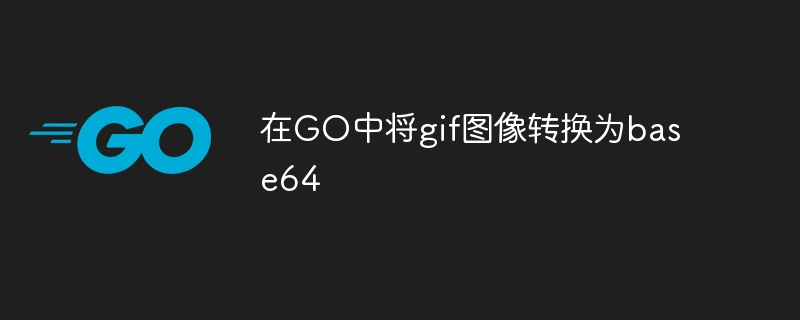Convert gif image to base64 in GO

In the GO language, converting GIF images to Base64 encoding is a common operation. By converting image data to Base64 encoding, we can easily embed images in web pages or transmit image data in string form. In the GO language, you can use the functions in the encoding/base64 package to achieve this conversion. This conversion is very simple and can be done with just a few lines of code. Below, I will introduce to you how to convert GIF images to Base64 encoding in GO language.
Question content
I'm trying to send a gif file via udp in go, I think the easiest way is to convert the gif image to base64 string and send it, but when I send the file When converting bytes to base64 it returns an empty string, I have tried the module "chilkat" using the following code:
bd := chilkat.NewBinData()
success := bd.LoadFile(path.Join(folderPath, "final.gif"))
if success != true {
panic("Fail!")
bd.DisposeBinData()
return
}
b64Data := *bd.GetEncoded("base64")
But it doesn't work, if anyone can help me
Solution
My solution is this:
var buff bytes.buffer gif.encodeall(&buff, &anim) based := base64.stdencoding.encodetostring(buff.bytes())
But the base64 string is obviously too long to send in udp, So the solution for correct sending is this:
encoded := recordScreenToGIF(seconds) // Record X seconds of screen, & convert the result into a base64 GIF
splited := SplitSubN(encoded, 10000) // Split "encoded" each 10K characters
conn.Write([]byte(strconv.Itoa(len(splited))))
for _, elm := range splited {
_, err = conn.Write([]byte(elm))
if err != nil {
panic(err)
}
time.Sleep(50 * time.Millisecond)
}
conn.Write([]byte("Done"))
The above is the detailed content of Convert gif image to base64 in GO. For more information, please follow other related articles on the PHP Chinese website!

Hot AI Tools

Undresser.AI Undress
AI-powered app for creating realistic nude photos

AI Clothes Remover
Online AI tool for removing clothes from photos.

Undress AI Tool
Undress images for free

Clothoff.io
AI clothes remover

AI Hentai Generator
Generate AI Hentai for free.

Hot Article

Hot Tools

Notepad++7.3.1
Easy-to-use and free code editor

SublimeText3 Chinese version
Chinese version, very easy to use

Zend Studio 13.0.1
Powerful PHP integrated development environment

Dreamweaver CS6
Visual web development tools

SublimeText3 Mac version
God-level code editing software (SublimeText3)

Hot Topics
 Which libraries in Go are developed by large companies or provided by well-known open source projects?
Apr 02, 2025 pm 04:12 PM
Which libraries in Go are developed by large companies or provided by well-known open source projects?
Apr 02, 2025 pm 04:12 PM
Which libraries in Go are developed by large companies or well-known open source projects? When programming in Go, developers often encounter some common needs, ...
 What is the problem with Queue thread in Go's crawler Colly?
Apr 02, 2025 pm 02:09 PM
What is the problem with Queue thread in Go's crawler Colly?
Apr 02, 2025 pm 02:09 PM
Queue threading problem in Go crawler Colly explores the problem of using the Colly crawler library in Go language, developers often encounter problems with threads and request queues. �...
 What libraries are used for floating point number operations in Go?
Apr 02, 2025 pm 02:06 PM
What libraries are used for floating point number operations in Go?
Apr 02, 2025 pm 02:06 PM
The library used for floating-point number operation in Go language introduces how to ensure the accuracy is...
 In Go, why does printing strings with Println and string() functions have different effects?
Apr 02, 2025 pm 02:03 PM
In Go, why does printing strings with Println and string() functions have different effects?
Apr 02, 2025 pm 02:03 PM
The difference between string printing in Go language: The difference in the effect of using Println and string() functions is in Go...
 How to solve the problem that custom structure labels in Goland do not take effect?
Apr 02, 2025 pm 12:51 PM
How to solve the problem that custom structure labels in Goland do not take effect?
Apr 02, 2025 pm 12:51 PM
Regarding the problem of custom structure tags in Goland When using Goland for Go language development, you often encounter some configuration problems. One of them is...
 What is the difference between `var` and `type` keyword definition structure in Go language?
Apr 02, 2025 pm 12:57 PM
What is the difference between `var` and `type` keyword definition structure in Go language?
Apr 02, 2025 pm 12:57 PM
Two ways to define structures in Go language: the difference between var and type keywords. When defining structures, Go language often sees two different ways of writing: First...
 Why is it necessary to pass pointers when using Go and viper libraries?
Apr 02, 2025 pm 04:00 PM
Why is it necessary to pass pointers when using Go and viper libraries?
Apr 02, 2025 pm 04:00 PM
Go pointer syntax and addressing problems in the use of viper library When programming in Go language, it is crucial to understand the syntax and usage of pointers, especially in...
 Go language slice: Why does it not report an error when single-element slice index 1 intercept?
Apr 02, 2025 pm 02:24 PM
Go language slice: Why does it not report an error when single-element slice index 1 intercept?
Apr 02, 2025 pm 02:24 PM
Go language slice index: Why does a single-element slice intercept from index 1 without an error? In Go language, slices are a flexible data structure that can refer to the bottom...






